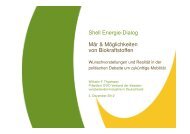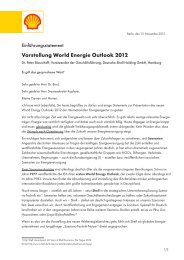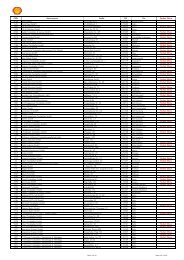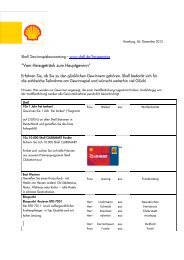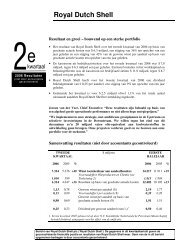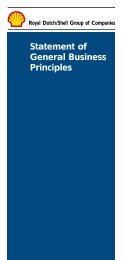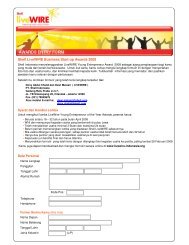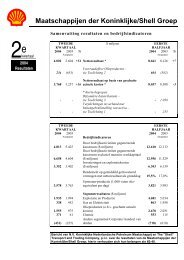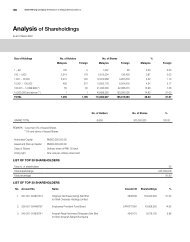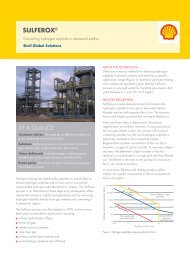62414 sustain 40pp (Mag)
62414 sustain 40pp (Mag)
62414 sustain 40pp (Mag)
Create successful ePaper yourself
Turn your PDF publications into a flip-book with our unique Google optimized e-Paper software.
RESPONSIBLE ENERGY<br />
Human rights<br />
Support for fundamental human rights is<br />
in our General Business Principles and an<br />
integral part of how we operate.<br />
We believe that companies have a role to play<br />
in upholding and promoting human rights in<br />
practical ways directly related to their business<br />
activities, and in supporting governments’ efforts<br />
to improve their human rights performance.<br />
Security and human rights<br />
Our Group Security Standard defines how<br />
we protect our people and facilities while<br />
respecting the human rights of others,<br />
including local communities. It only permits<br />
armed security when required by law or when<br />
there is no other acceptable way to manage the<br />
risks. When we do rely on armed guards, they<br />
are required to follow our Shell guidelines in<br />
this area, which are based on United Nations<br />
guidelines and conventions on the use of force.<br />
Under our guidelines, armed guards are to be<br />
issued with pocket-sized cards describing how<br />
force may be used. They are expected to first<br />
attempt to resolve a security incident without<br />
using force. If this fails, then only the<br />
minimum force needed can be used and help<br />
offered to anyone injured as a result, including<br />
offenders. Regular checks are made on whether<br />
armed guards understand these rules.<br />
By the end of 2006, several operations in<br />
countries with high security risks, including<br />
Nigeria and Pakistan, were also implementing<br />
the Voluntary Principles on Security and<br />
Human Rights. These Principles were<br />
developed for the energy sector by companies,<br />
governments and leading human rights NGOs.<br />
SPHERES OF ACTION AND<br />
RESPONSIBILITY<br />
Over the past 20 years, society’s<br />
expectations of business in this<br />
area have grown. Companies<br />
have grown uncertain about<br />
their role and where<br />
responsibility lies when<br />
governments do not fulfil their<br />
human rights obligations. A<br />
United Nations initiative is<br />
currently underway to clarify the<br />
boundaries between public and<br />
private accountabilities. We are<br />
participating in this process.<br />
24 THE SHELL SUSTAINABILITY REPORT 2006<br />
5 4 3 2 1<br />
Resettlement<br />
In all countries, people sometimes need to be<br />
moved to make room for new facilities, including<br />
energy infrastructure. Resettlement is usually<br />
carried out by governments. On our projects, we<br />
encourage the use of international standards,<br />
including consulting communities about<br />
resettlement plans and providing compensation<br />
to at least restore previous living standards. To<br />
construct the Nanhai petrochemicals complex in<br />
China, for example, more than 2,700 households<br />
were resettled to Chinese and World Bank<br />
standards. Our joint venture supported the<br />
government’s programme to provide higherquality<br />
housing for resettled villagers, and is<br />
continuing to help to find employment, build<br />
skills and create small businesses.<br />
Managing country risks<br />
The search for oil and gas can take energy<br />
companies to places with poor human rights<br />
records. This clearly presents challenges and<br />
trade-offs. Refusing to operate opens the door<br />
for less-principled competitors. Staying in such<br />
countries puts a company at risk of being seen<br />
as complicit in a government’s practices. We<br />
decide case by case, based on whether we are<br />
able to follow our Business Principles. We work<br />
with the Danish Institute for Human Rights to<br />
understand and address the human rights risks<br />
we face in particular countries. The Institute’s<br />
Country Risk Assessments compare local laws<br />
and practices with the Universal Declaration of<br />
Human Rights and more than 80 other<br />
international treaties. It identifies the main risk<br />
areas in a country – like labour rights for<br />
foreign labourers or the behaviour of security<br />
forces. We then test our procedures and<br />
practices for respecting these rights, and work<br />
to close any gaps. In 2006, initial assessments<br />
were done for Ukraine and Kazakhstan.<br />
Raising staff awareness and skills on human<br />
rights remains a priority for us. With the<br />
Danish Institute we reviewed our human rights<br />
training effort in Nigeria. As we committed to<br />
do in 2005, we trained another 500 field staff<br />
there in managing difficult situations, like<br />
responding to conflict in local communities.<br />
Rights of employees<br />
Shell employees can raise grievances through<br />
formal procedures, staff forums, confidential<br />
advisers and a global helpline available 24<br />
hours a day. Staff are free to join a union<br />
wherever permitted by national law. According<br />
to our annual internal questionnaire of senior<br />
country representatives, an estimated 12% of<br />
staff, in countries where that information is<br />
legally available, were union members in 2006<br />
(more on this data page 37).<br />
We are committed not to exploit children,<br />
through direct employment or indirectly<br />
through joint ventures, contractors or suppliers.<br />
According to the same internal questionnaire,<br />
at the end of 2006, Shell companies in 95% of<br />
countries where we operate had procedures to<br />
prevent child labour. Of the 5% who didn’t,<br />
nearly all were in countries with well-enforced<br />
laws on child labour. The same questionnaire<br />
indicated that Shell companies in around 90%<br />
of countries had procedures in place to prevent<br />
the use of forced labour.<br />
Additional web content:<br />
• Lessons learned from using our Country<br />
Risk Assessments.<br />
• Other Shell human rights tools, guidelines and training.<br />
• Background on Shell’s use of the Voluntary Principles<br />
on Security and Human Rights.<br />
www.shell.com/humanrights<br />
Since 2000, we have being using this diagram to help us define our human<br />
rights role:<br />
1. Employees. Direct responsibility. Issues include labour rights and working conditions, for<br />
example, providing a safe and healthy workplace (page 22) and avoiding discrimination.<br />
2. Suppliers, contractors (including security personnel). Significant influence through screening,<br />
setting contract standards and providing training. Issues include: safety, respectful treatment of<br />
third-country nationals, local hiring.<br />
3. Communities. Opportunity to support government efforts. Issues include: use of international<br />
standards when relocating people, creating local business opportunities through operations or social<br />
investment (page 26).<br />
4. National governments. Opportunity to support government efforts by contributing to economic<br />
development, and encouraging transparency of revenues, for example through the EITI (page 28).<br />
5. International efforts. Opportunity to help, for example by supporting international human rights<br />
declarations and voluntary initiatives, providing input on international codes, and developing tools<br />
to help businesses comply.


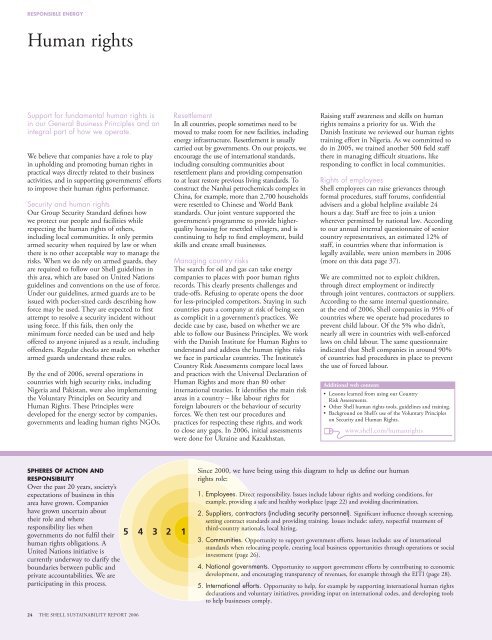

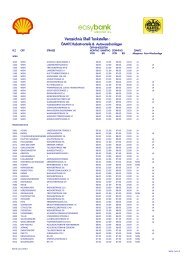
![Download Shell AutoGas Stationen [Stand: Januar 2013] (PDF](https://img.yumpu.com/9982753/1/190x245/download-shell-autogas-stationen-stand-januar-2013-pdf.jpg?quality=85)
